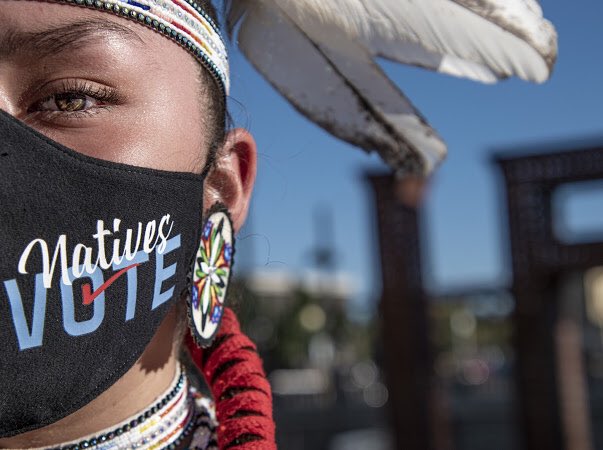
- Details
- By Neely Bardwell
Native Vote 2024. Native Organizers Alliance, an organization that makes changes in mainstream leadership and policy through advocacy, capacity building, and campaign support, announced that applications for their post-election National Native Community Organizer Training are now open. Trainings are for Native organizers and Tribal leaders working to engage community members.
The training is a week-long gathering November 11-16 and will focus on improving community organizing skills in order to build effective grassroots campaigns and movements. These trainings are a part of Native Organizers Alliance’s year-round efforts of growing a powerful ecosystem of Native leaders who will continue to build collective community power.
The training will be held in Federal Way, Washington State. The cost of housing, transportation, and most meals will be covered by the Native Organizers Alliance. Tribal and Native community leaders in rural, reservation, or urban communities -- and the staff of Native nonprofits, service agencies, and Tribal entities are encouraged to apply.
At the gathering, speakers plan to explore how communities have traditionally and historically used traditional values to organize in communities and how they can continue to do so today. They also plan to discuss building political power for change and how Tribal and urban communities can challenge the power that denies Native peoples’ inherent and sovereign rights.
The Alliance hopes that through engaging with the history of intertribal cultural values of building community, attendees will go home energized and ready to continue the community organizing work.
More Stories Like This
Native News Weekly (August 25, 2024): D.C. BriefsNavajo Nation Mourns the Passing of Former Vice President Rex Lee Jim
Deb Haaland Earns Endorsement From Communications Workers of America Local 7076
University Soccer Standout Leads by Example
Two Native Americans Named to Democratic Congressional Campaign Committee's“Red to Blue” Program
Help us defend tribal sovereignty.
At Native News Online, our mission is rooted in telling the stories that strengthen sovereignty and uplift Indigenous voices — not just at year’s end, but every single day.
Because of your generosity last year, we were able to keep our reporters on the ground in tribal communities, at national gatherings and in the halls of Congress — covering the issues that matter most to Indian Country: sovereignty, culture, education, health and economic opportunity.
That support sustained us through a tough year in 2025. Now, as we look to the year ahead, we need your help right now to ensure warrior journalism remains strong — reporting that defends tribal sovereignty, amplifies Native truth, and holds power accountable.
 The stakes couldn't be higher. Your support keeps Native voices heard, Native stories told and Native sovereignty defended.
The stakes couldn't be higher. Your support keeps Native voices heard, Native stories told and Native sovereignty defended.
Stand with Warrior Journalism today.
Levi Rickert (Potawatomi), Editor & Publisher


